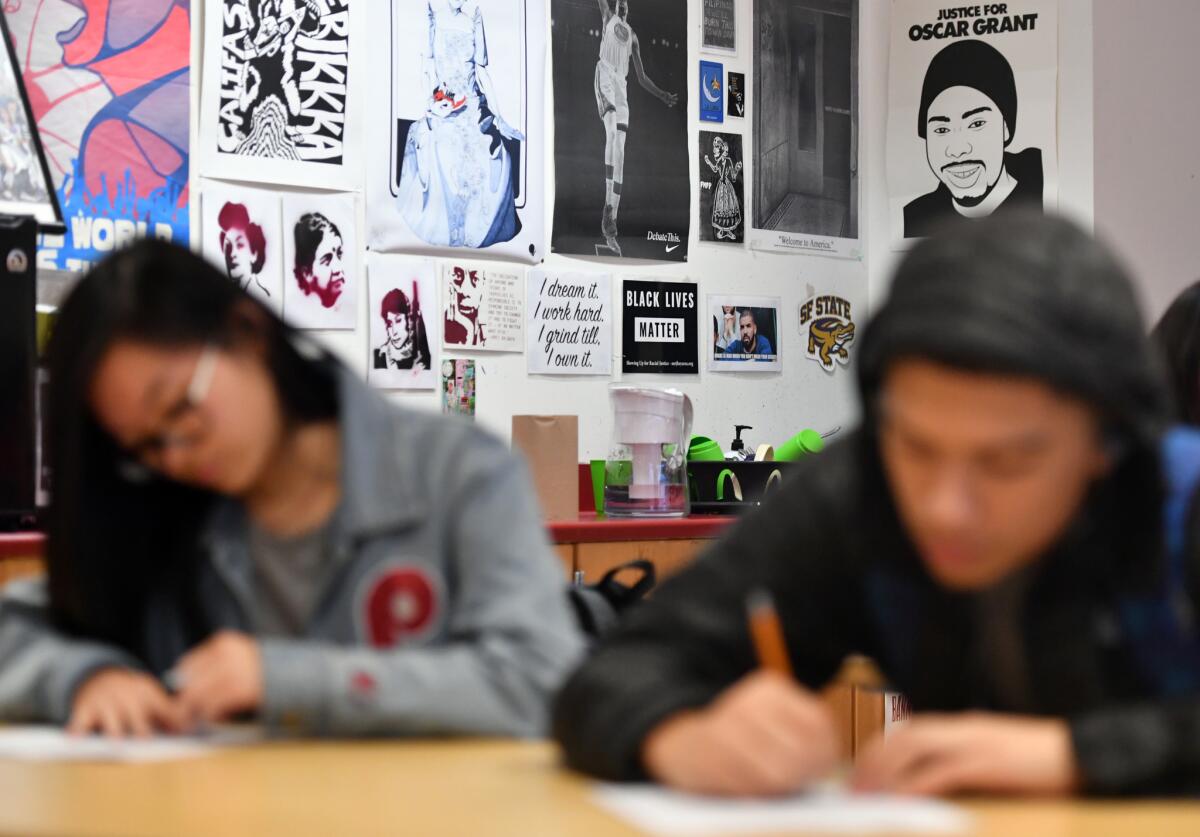What happens now that Gov. Newsom vetoed high school ethnic studies requirement?

- Share via
Ethnic studies supporters expressed disappointment after Gov. Gavin Newsom vetoed a bill that would have required high schoolers to take the course, while work mandated by law to develop a model curriculum for it continues apace — as does the controversy around it.
Under the bill vetoed late Wednesday, written by Assembly Member Jose Medina (D-Riverside), all public high school students in California would have had to take at least one semester of ethnic studies in order to graduate, beginning with the class of 2029-2030. A separate bill, written by former Assembly Member Luis Alejo (D-Salinas) and signed into law in 2016, requires the state to create and adopt a model curriculum for ethnic studies courses by March 31, 2021.
In his veto message, Newsom said he values the role of ethnic studies in helping students understand the experiences of marginalized communities and that he supports schools and districts offering such courses. But, he said, there was too much uncertainty about the content of the model curriculum and he wanted to be sure it “achieves balance, fairness and is inclusive of all communities.”
Since its founding half a century ago, ethnic studies has been defined as focusing on the experiences, histories and contributions of four racial/ethnic groups that have historically been marginalized and oppressed in the United States: African Americans, Latino Americans, Native Americans and Indigenous peoples, and Asian Americans. Coursework emphasizes “auto-ethnography,” encourages students to “tell their own stories,” and engage in social justice, according to descriptions from curricula and teachers.
Theresa Montaño, a professor of Chicana and Chicano Studies at Cal State Northridge and a member of the advisory committee that helped develop the first draft of the ethnic studies model curriculum, said Thursday that Newsom’s veto message was “painful.”
“White people in this society can still with the stroke of a pen say to children of color in this state that your history doesn’t matter and that the only way your history will be told is if we get to sanitize it, scrutinize it and approve it before it gets to you. That I think is to me the most painful,” she said.
The legislation would have required all public high school students in the state to complete a semester of ethnic studies.
Medina, the bill’s sponsor, said Thursday that his bill’s intent to make ethnic studies a standard component of high school education got confused with the debate over how inclusive an ethnic studies curriculum should be.
Under his bill, courses developed off the model curriculum would have met the requirement, but so would other ethnic studies courses.
“Some of the discussion that I saw that took place this time made a lot of reference to where the curriculum was a year ago. And that is certainly very different from where the curriculum is now,” he said.
In the summer of 2019, state education officials released a first draft of the model curriculum to intense controversy, particularly from Jewish groups, including the California Legislative Jewish Caucus, whose members objected to their lack of inclusion and a perception that the curriculum and sample lesson plans were anti-Semitic. After a lengthy public comment and revision process, officials issued a new draft in July, which the caucus said “addresses the most critical concerns raised by our community last year.”
But when it later became clear that the curriculum would include a sample lesson on Arab Americans, many Jewish and other ethnic groups once again mobilized.
Sarah Levin, executive director of Jews Indigenous to the Middle East and North Africa, said her group supports “high-quality, rigorous ethnic studies” but wants to see the curriculum include “balance in its portrayal” of Middle Eastern communities and “equitable representation” for other groups, such as Iranian Americans, Kurdish Americans, and Mizrahi Jews. She said also that the curriculum should include a lesson plan on anti-Semitism.
“Let’s continue improving this and getting this to the right place where we’re all content and where we all feel like we’re meaningfully included,” she said.
Daniel Thigpen, a spokesman for the California Dept. of Education, said it had received at least 9,000 letters from the public on the latest curriculum draft.
At the crux of the challenge, Thigpen said, is how to balance that feedback and demands for inclusion with fidelity to the definition of ethnic studies.
“The position of the department right now and how we’re navigating that is by listening,” he said.
The department is currently synthesizing the public comments, reviewing additional materials and sample lesson plans, and working to produce another revision of the curriculum ahead of the next meeting of the Instructional Quality Commission in November. The commission can then either adopt that version or modify it further before opening it up for another 45-day public comment period and forwarding it to the State Board of Education.
Medina said he plans to reintroduce his bill as soon as he returns to the Legislature in December.
“California is the most diverse state in the United States. We should have it within our ability to teach students differently from what we’ve done for the last 50 years,” he said. “I am very hopeful that we get there next year.”
More to Read
Sign up for Essential California
The most important California stories and recommendations in your inbox every morning.
You may occasionally receive promotional content from the Los Angeles Times.












